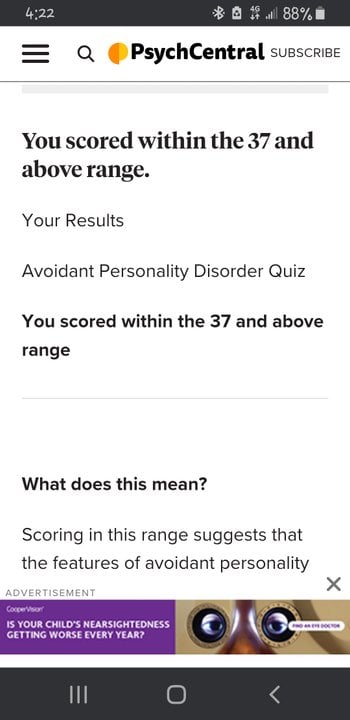Avoidant Personality Disorder Test:
Your Results
Avoidant Personality Disorder Quiz
You scored within the 37 and above range
What does this mean?
Scoring in this range suggests that the features of avoidant personality disorder seem similar to the items you endorsed. Consider taking the brave step and share these traits and behaviors with a qualified mental health professional. They can help determine if it's possible if avoidant personality disorder is impacting you, or if you have other issues that are impacting your mental health.
Taking this quiz and openly endorsing items in a truthful manner can be the first step in proper diagnosis.
Most people with avoidant personality disorder want to make connections; but they're blocked by their feelings of inadequacy and fears of being shamed, embarrassed or criticized. By learning that avoidant personality may be present, steps can be taken to address, manage, and treat this mental health condition. There's always hope.
People with avoidant personality disorder (AVPD) intensely fear rejection. This fear is so intense that it leads them to isolate rather than risk rejection.
This fear can also lead them not to try new things or to self-sabotage in order to control the outcome of something they attempt.
Like many personality disorders, avoidant personality disorder exists on a spectrum from mild to extreme.
The most common symptoms of avoidant personality disorder include:
sensitivity to criticism
fear of humiliation
reluctance to make new friends
extreme anxiety in social settings or relationships
avoidance of jobs that involve working in teams
shyness, awkwardness, and self-consciousness in social situations
exaggeration and overthinking of potential problems that could arise in social situations
reluctance to try new things
poor self-image
Because of the isolating nature of this disorder, people with avoidant personality disorder often also experience depression and are at a higher risk for substance misuse.Even if they’re natural introverts, they still long for connection and camaraderie with friends and romantic partners.
Avoidant people aren’t asocial –– they genuinely want to be around others. They may be able to forge strong friendships with people who can convince the avoidant person of their affection.
Hmmmm, could be.🤔
https://psychcentral.com/quizzes/avoidant-personality-disorder-test
Avoidant Personality Disorder Quiz
You scored within the 37 and above range
What does this mean?
Scoring in this range suggests that the features of avoidant personality disorder seem similar to the items you endorsed. Consider taking the brave step and share these traits and behaviors with a qualified mental health professional. They can help determine if it's possible if avoidant personality disorder is impacting you, or if you have other issues that are impacting your mental health.
Taking this quiz and openly endorsing items in a truthful manner can be the first step in proper diagnosis.
Most people with avoidant personality disorder want to make connections; but they're blocked by their feelings of inadequacy and fears of being shamed, embarrassed or criticized. By learning that avoidant personality may be present, steps can be taken to address, manage, and treat this mental health condition. There's always hope.
People with avoidant personality disorder (AVPD) intensely fear rejection. This fear is so intense that it leads them to isolate rather than risk rejection.
This fear can also lead them not to try new things or to self-sabotage in order to control the outcome of something they attempt.
Like many personality disorders, avoidant personality disorder exists on a spectrum from mild to extreme.
The most common symptoms of avoidant personality disorder include:
sensitivity to criticism
fear of humiliation
reluctance to make new friends
extreme anxiety in social settings or relationships
avoidance of jobs that involve working in teams
shyness, awkwardness, and self-consciousness in social situations
exaggeration and overthinking of potential problems that could arise in social situations
reluctance to try new things
poor self-image
Because of the isolating nature of this disorder, people with avoidant personality disorder often also experience depression and are at a higher risk for substance misuse.Even if they’re natural introverts, they still long for connection and camaraderie with friends and romantic partners.
Avoidant people aren’t asocial –– they genuinely want to be around others. They may be able to forge strong friendships with people who can convince the avoidant person of their affection.
Hmmmm, could be.🤔
https://psychcentral.com/quizzes/avoidant-personality-disorder-test




